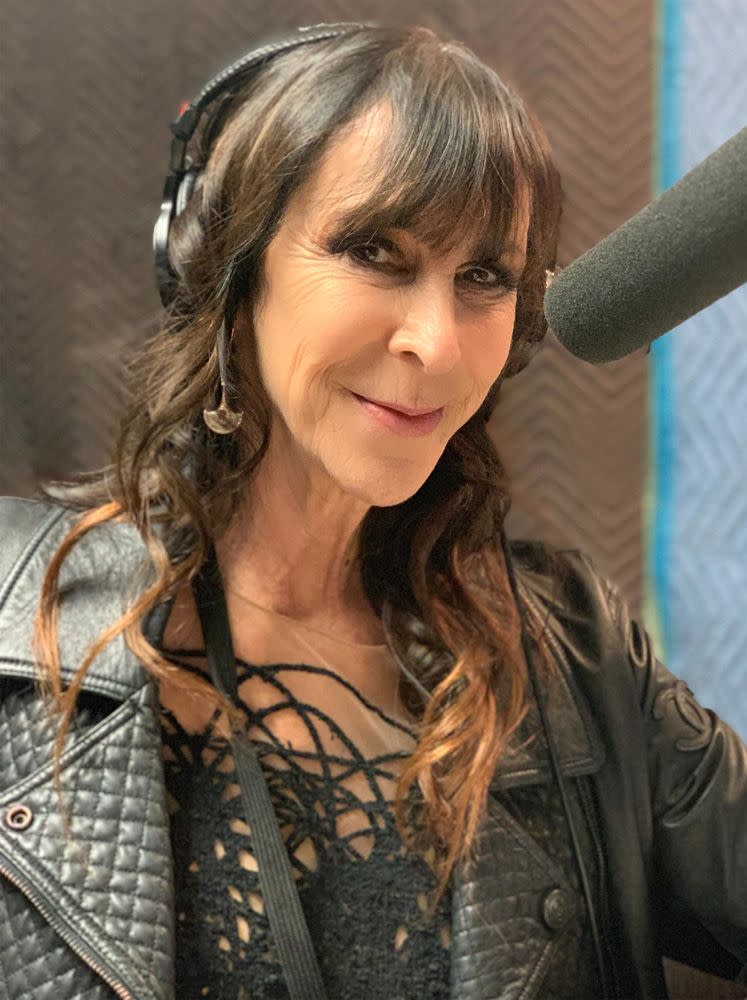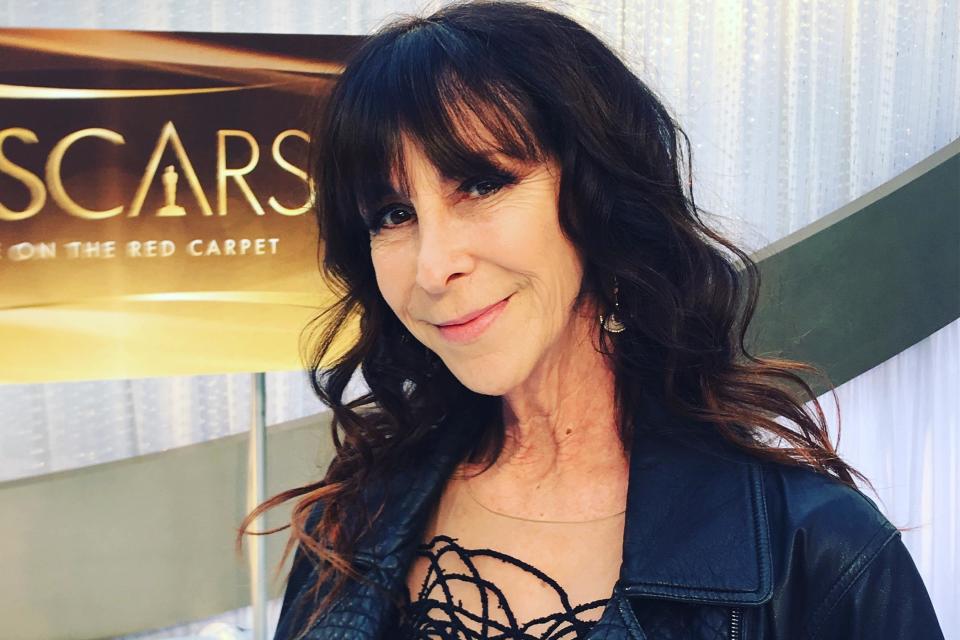The Oscars' 'voice of God,' Randy Thomas, answers our burning questions
There’s one unsung hero of the Oscars broadcast you’ve probably never seen before — but you’ve definitely heard her.
Randy Thomas, the “voice of God” for 10 Academy Awards ceremonies on and off since 1993, provided the voice-over announcements at the ceremony this year; her job description includes introducing presenters and vocally escorting winners to the stage by sharing trivia about them as they traverse a path from their seats to the microphone. “My job is to have an elegant presence while moving the show forward and connecting everything,” Thomas tells EW.
As she carves an audible path for winners, Thomas is a trailblazer herself, as the first woman ever selected for the job. Prior to getting the gig, it wasn’t something she’d even dreamed of doing. “Until I did it, there were no women,” she says, “and it didn’t occur to me to question that.”
Thomas first took on the role at the 65th Oscars, a show that was dubbed the “Year of the Woman” and honored cinema’s living female legends. That moniker would also fit the 91st show on Sunday, with its record-breaking number of female winners (15 in all). Thomas has gone on to be the first female announcer for countless other live events, including the Tony Awards, the Rock & Roll Hall of Fame induction ceremony, and the Kennedy Center Honors.
The morning after this year’s Oscars, we called Thomas up to get the details on what it takes to be the “voice of God,” how she nails the pronunciation of every winner’s name, and the crazy places her career has brought her.
ENTERTAINMENT WEEKLY: You’ve done this 10 times now. How did you first land the gig?
RANDY THOMAS: My first Academy Awards was in 1993. I was the first woman in history because it was “Year of the Woman,” where they brought back every living legend that was still on the planet. We honored them all, and they wanted to use a woman for a first time. It was the 65th Academy Awards, and I won the audition and it changed my life.
In the intervening years, what has brought you back?
Generally, the choice of an announcer is left to the producers. It changes with every producer, so the producer that brought me in was Gil Cates. So I did it in ’93, ’95, ’97, ’99, ’03, ’05, ’08, then 2017, 2018, and this year, 2019. So it was sort of spread out. In the last three years, I have worked with Glenn Weiss, who is the amazing director that headed up everything and produced this year.
So many people dream of making it to the Oscars — did you ever think this was how’d you get there?
Actually, no. I could not have imagined it. To be the announcer of the Oscars was not a dream because until I did it there were no women, and it didn’t occur to me to question that. Being the first woman in history was an incredible honor, and because there are so few people on the planet that do these live global shows, when I did the Oscars for the first time, I then became the first woman to do pretty much every show — the Tonys, the SAG Awards, the Emmys, the AFI [Life Achievement Award]. The Kennedy Center Honors I’ve been doing for five years. Rock & Roll Hall of Fame, I was the first woman to do that. It’s opened a lot of doors for me, and it’s just been an incredible ride.
Being the first woman on so many shows, is that particularly meaningful to you? Why do you think it’s important for viewers to hear a woman’s voice here?
We’re living in a time today where there is a great curiosity about voice-over work with the incredible amount of animation. There’s a great interest in voice-over work. I hope that I can inspire any young woman or young man who wants to do this work and one day be the voice of the Oscars. I’m thrilled that they would look at this as something they might want to do because they’ve been exposed to it.
What makes each year unique?
Movies change, times change, and we reflect that back to the audience.
Do you have input into scripts? Or ever tweak them to fit better with your voice and cadences?
I read the words that are given to me. I don’t try to rewrite anything. I don’t do anything but take the writer’s words and bring them to life on the show. I wish they’d write more comedy for the announcer, but they never seem to.
This is the first time you’ve worked the broadcast when they’ve had no host. Did that change things for you or make things more hectic?
Absolutely. I had to do all of the introductions that the host would’ve done. I was incredibly busy. But I think it made the show go by faster for me because every couple of minutes they were coming to me for another announce, so the night flew by for me.
How often does your script change the night of? Is there a lot happening on the fly?
There are some things that might happen during the course of our live show, but mostly we have prepared for it in advance by creating alternate announces for me. If this happens, then I say this; if this doesn’t happen, then I say that. I work the show with the script supervisor, who writes all of the winner walk-up copy. That’s my job, to give you the little information about the winner from the minute they say, “And the Oscar goes to….” I escort them from their seat to the stage vocally in sharing a tidbit or two about them.

How do you nail pronunciations with so many names to get right?
What happens in an early recording session once we know who all the nominees are, I go to a studio. I work with the Academy historian, Lucia Schultz — she is an incredible resource. She speaks a few languages but can pronounce names in any language, and she sits with me. We do the packages that you see on the show for each nomination, and then those packages are sent to all the presenters so that they can learn how to say the names through my presentation. Then when they come in for rehearsal, we grab them after their rehearsal, bring them down into the recording studio at the Dolby [Theatre]and they re-record the packages in their voice, and that replaces my voice. As you might have heard last night, my voice did appear in the show because Guillermo Del Toro had been sick and wasn’t able to come for rehearsal, so they weren’t able to redo the package with his voice on it, so when it came to the award for Best Directing my voice was still on the package. Otherwise I get replaced by all of the celebrities, and that’s cool.
But you’re still going to be calling their names out when they win.
Correct. I really hope that by the time we’ve gotten through all the rehearsals to the live show that I’ve had a chance to read each one of the nominees live in the room. Hopefully I’ve gone through it enough with Tina Cannizzaro DeBone — she writes all of the winner walkups — and we work the entire show together for the entire time that I’m at the theater, from rehearsals till the end of the show. She’s brilliant. She does amazing directing with me. And working on the names and making sure we’ve mastered the pronunciations before we go live.
Is there a name you’ve most enjoyed introducing over the years?
Well, of course, I did get to introduce her last night and I love saying “Barbra Streisand.”
Do you have a favorite moment you’ve witnessed or been a part of announcing?
Every time I do this show there is a moment that I fall in love with. Every year there are surprises, there’s excitement, there are moments that are just beautiful.
Was there a moment that stood out to you last night?
I loved Olivia Colman’s speech. She was so real and in the moment. She was honestly shocked that she won. And when she apologized to Glenn Close, I thought that was a really great moment. She was just being honest and excited and overwhelmed live on television and we were right there with her, but her natural default personality just made it a very funny speech.
What’s the most challenging moment you’ve been a part of, whether that was something you had to smooth over with voice-over or something else?
When I first started the Oscars, before they were doing red carpet shows from the network and whatnot, I actually had to do a sequence that was almost five minutes long before we even got into the theater. We would condense the red carpet, show you all the big stars, and the camera would hold on them for maybe two or three seconds each. They would give me index cards so as we would see that star, they would tap me, I would read the index card, throw it, and wait for my next tap. Because it was moving so fast that if I looked at the screen and then read, they’d be gone by the time I finished, and then we’d be behind. That was the hairiest, craziest part of the Oscars. Now the red carpets do their own show and the opening is a lot simpler.
Do you have other hidden talents?
I can say my alphabet backwards. Many years ago, I was the voice of a reading program called Hooked on Phonics. That was me on those commercials, “Call 1-800-ABC-DEFG.” That was when I was a DJ on the radio, and that was the first big program that I became attached to. [I was on] all the commercials, and actually the voice of the program teaching kids to read, which was incredibly rewarding and fun. But that’s how I learned to say my alphabet backwards.


